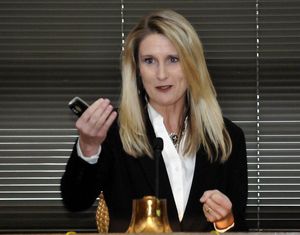The job market is changing, and Oklahoma career and technology education is ready. Marcie Mack, director of the State Board of Career and Technology Education, spoke at the Enid Rotary meeting on Monday and discussed how the career tech department is growing Oklahoma’s work force. Mack is no stranger to career tech — she worked at Autry Technology Center in Enid for 19 years before joining the state department in 2013 and being named state director in January.
Technology centers came on board in career tech in the 1960s, she said, and Autry is one of the five original in the state. “Our primary mission is the same,” she said. “As we move forward, we look to secure the future by developing a world-class work force.” By 2023, Mack said the department projects a 12.3 percent change in job trends, with more people who obtained associate degrees or certificates and credentials from career tech holding most of the jobs. In 2015, 54 percent of new jobholders were educated through career tech, she said; 23 percent of the remaining jobs went to people with a high school diploma or less; 19 precent of new jobholders had bachelor’s degrees; and five percent of new jobholders had graduate degrees.
The state department is working to grow Oklahoma’s work force in a variety of ways, including creating career tech partnerships with business and industry leaders for specialized training, she said. “We want to continue to build those partnerships with our technology centers and private businesses,” she said. The state department also has created a tool that students can use to figure out what they “want to be when they grow up,” Mack said. “OkCareerGuide.org provides individuals — whether they’re in an education setting now or if they’re in the work force and want to update their skills — they can utilize this tool to look at various careers in the state and the skill sets it takes to meet that career,” She said. “One of the biggest advantages I see is the fact that we can help educate our students in Oklahoma and keep them here in Oklahoma.” The department launched the website in August, and already has 20,000 new users, she said.
Student organizations like SkillsUSA, Future Farmers of America and Family, Career and Community Leaders of America are important tools for students to learn leadership and employability skills, Mack said, and the state department is proud to have seven student organizations across various occupational areas.
“We are very dedicated to making sure this is an integral part, not an extracurricular part, of career technology training programs,” she said.
The state department has career tech programs in more than 390 comprehensive schools across the state, 29 technology centers and 13 various programs in skills centers, Mack said. “The skills centers are actually housed within correctional facilities around the state,” she said. “We also work in community corrections and we have a facility here in Enid at Enid Community Corrections to help those individuals as they finish their sentences and get out into the work force.”
In fiscal year 2015, 35 percent of students sixth through 12th grades were involved in career tech programs across Oklahoma, Mack said. “We are fortunate to have students as young as sixth grade engage in career technology education as they move forward,” she said. Career tech had more than 500,000 enrollments through postsecondary, skill centers and technology centers last year, she said. “With our 13 skills centers sites, we serve a little over 1,600 individuals and help provide them with employability skills, industry credentials and assistance as they transition into the work force,” she said. Oklahoma career tech education has a direct impact on the state’s economy, too. Annually, career tech makes a $3.5 billion economic impact, Mack said. “It is a direct impact on the economy, and making sure we provide the students of Oklahoma with the best educational experience that we can so they can continue on their career path, benefits them as an individual and the state as a whole,” she said.
Story by: Sally Asher with Enid News & Eagle


